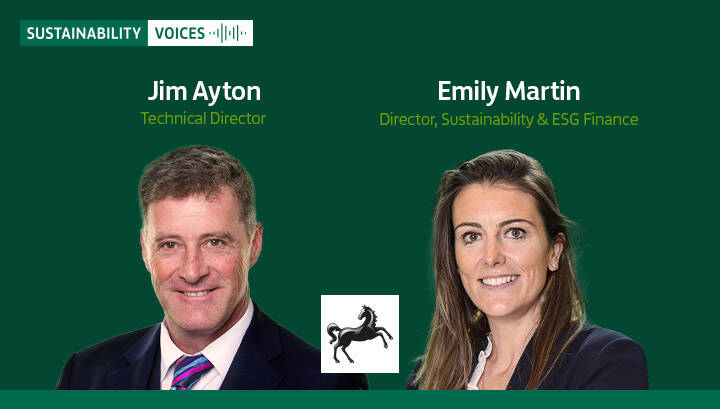Our customers stand to benefit as policymakers and the energy sector consult on commercially-viable net zero technologies. Our technical expertise in these discussions is a key driver of value, write Emily Martin, Director, Sustainability & ESG Finance, Lloyds Bank and Jim Ayton, Technical Director, Energy Transition and Commodities, Lloyds Bank.

The recent Autumn Statement delivered by Chancellor Jeremy Hunt suggests the UK remains fully committed to the Glasgow Climate Pact agreed at COP26 including a 68% reduction in the UK’s emissions by 2030.
Emerging technologies have a vital role to play in this ambitious government climate goal. If decarbonisation targets are unmet for net-zero carbon emissions by 2050 and climate change is left to run its course, the consequences will be severe. With the right funding, however, sustainably minded companies can rapidly advance their net-zero technologies, futureproofing themselves as well as our society and the environment.
Lloyds Bank is committed to supporting our clients through a just energy transition as part of our commitment to help create more sustainable and inclusive communities. What does this mean? It means a move towards net-zero carbon emissions that places people at the heart of the process, so it happens in a socially equitable way. A key part of this will be creating green jobs, securing our energy supply, and helping to prevent fuel poverty in a future powered by renewable energy sources.
Net zero technologies
How will net-zero technologies shape a low-carbon future? Our ESG finance team have identified more than 85 technologies across 14 technology themes, that could have the most material impact in helping businesses across the UK move towards net-zero, and that’s where funding is being targeted. These crucial technologies include wind and solar power, new nuclear, large-scale energy storage, hydrogen and the electrification of heat and transport.
By the end of 2023, we will have completed a deep dive into each of these core technologies, guided by the UK government’s Net Zero Strategy. It will require a thorough analysis of the risks and advantages, the economic and societal impact each technology could have, and how the technologies can support regional regeneration across the UK. In fact, by 2024, Lloyds Bank will have provided £15bn of sustainable financing for corporate and institutional clients, some of which will be targeted towards implementing these technologies and reaping the decarbonising impacts.
For instance, floating offshore wind energy will be vital to ensure the supply of electricity needed to generate more hydrogen, which will be a valuable contributor to a net-zero future.
The policymakers agree. This year the UK government updated its UK Hydrogen Strategy with a hydrogen sector development plan, acknowledging that, since the original report was published, “it has become even clearer that hydrogen must be a core part of the UK’s future energy security.” The government wants the UK to double its low-carbon hydrogen production capacity by 2030, supporting the creation of more than 12,000 green jobs across the sector. Providing the capital can help build capacity more quickly, with larger turbines to create more wind energy further offshore.
Innovation will need continued government support
Innovation is crucial, and companies are pursuing opportunities to rapidly advance progress, alongside the right government policies to help de-risk the technologies. Government support will be critical to overcome these hurdles, and the energy transition should remain firmly on the political agenda because it is already seeking to advance the UK towards a more resilient, sustainable energy mix. Meanwhile, the environmental cost of not prioritising the energy transition is well understood, and the social cost is also increasing with rising energy bills and concerns over energy security.
Lloyds Bank’s ESG finance team works closely with the energy sector, taking part in government and industry consultations on emerging new technologies. Taking a technically led approach, our engineers, policy experts and market analysts engage across a breadth of net-zero technologies to better understand their applications, risks, real economy benefits and how best to fund them. Sharing our technical experience has allowed us to further accelerate investment and will help to upscale these technologies for mitigating the worst potential impacts of climate change.
Net-zero technology is a fast-evolving space and will require the government to remain proactive so it can focus support and funding to the right areas at the right time. Without government support, the UK simply won’t reach its net-zero target. The result will be rising sea levels, extreme weather events, droughts, floods, and forest fires that will displace people, destroy natural capital and damage supply chains globally.
The economy rewired
Sustainable companies making the right long-term choices today by investing in a low-carbon future are essential to avoiding a climate disaster scenario. Not only will they make people and planet more resilient, but sustainable businesses themselves will be better prepared for the future.
We want to lead by example, so Lloyds Bank is aligned with the Net Zero Banking Alliance and we have shared our ambition to work with customers, the government and the market to halve the carbon emissions we finance by 2030. The UK government’s net-zero target is ambitious and will require a complete rewiring of our economy. This means policymakers, business and society will each play a critical role, but they won’t be able to do it alone – collaboration is needed.
Lloyds Bank stands by the side of business by supporting net-zero technologies for a greener, more sustainable future.
All lending is subject to status.
N.B. The information contained in this entry is provided by the above supplier, and does not necessarily reflect the views and opinions of the publisher


